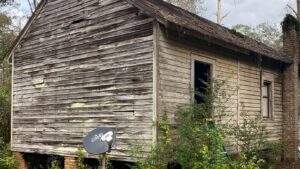
The Leon County commissioners voted Tuesday unanimously to seek state or federal reparation funds to preserve the Lake Hall Schoolhouse.
The Lake Hall Schoolhouse is one of six of the oldest African American schoolhouses still standing in Florida. According to county documents, the school was built in the 1870s and taught a small African American community off Thomasville Road.
Over the past couple of decades, the schoolhouse received state-funded preservation grants and funds allocated to the John G. Riley Center for possible relocation. In 2020, commissioners considered moving the school, but according to an earlier study, the building is in poor condition.
The issues to preserve the historic schoolhouse include funding and gaining access to the location. This decision came after community members, organizations, and even some commissioners considered the use of the eminent domain. Eminent domain is the power of the government to take private property for public use with compensation.
Commissioner Brian Welch was one of the commissioners to support the use of the eminent domain to protect the building.
“Now I recognize there are challenges, and my second reason for doing this [pulling consent item for discussion] was to explore that we as a board of county commissioners have done everything absolutely possible that we could do to secure this property, and that includes eminent domain … and I would support seeking eminent domain to preserve this property,” Welch said.
Developers built private residential properties around the schoolhouse, which is hindering its preservation. Commissioners considered building a public road to access the property, but owners do not want public access to their homes. Geraldine Seay, a retired Florida A&M University professor and historian, has been leading an organization to preserve the building for about three years.
According to Saey, the Friends of Lake Hall Schoolhouse, the schoolhouse’s charitable organization, helped the school gain access to the local registry.
The local registry protects the building and keeps it from being torn down.
During the meeting, Seay explained the sole reason for the inaccessibility of the school.
“Everyone says it’s [the schoolhouse] inaccessible, but you have to remember that inaccessibility was a part of the plan. In 1870 schools were not necessarily things that the majority of the owners of the plantations wanted to have. So, naturally freed slaves who had purchased this land put a school on their property,” Seay said.
She also has helped seek several funding opportunities for the historic building but could not move forward because of property ownership.
“There have been several grant opportunities that we have not been able to pursue because we do not own the property,” Seay told commissioners.
Seay and other community members wanted to gain access to 10 more feet around the schoolhouse to help make it a public historical park. If the schoolhouse becomes a public park, it would be eligible for funding that will allow the building to stay in place and be open to the public.
Shelby Green, a Tallahassee resident, highlighted the importance of the Leon County commissioners preserving the “hidden history of Leon County.”
“I do think this board should use its power to highlight the hidden history of Leon County … there’s children and adults I have spoken to who had no idea this history even existed,” Green said.
During the meeting, Commission Chairman Bill Proctor suggested adding a historical landmark to the location.